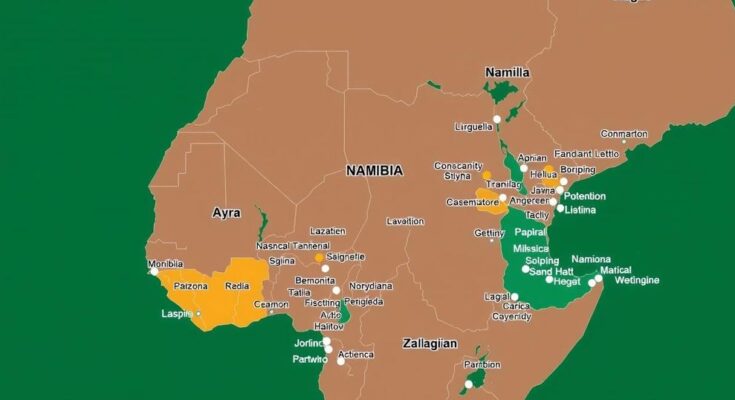Namibia’s election on Wednesday poses a substantial challenge to SWAPO as it faces discontent among voters due to economic issues and high youth unemployment. This election is notable as youth representation grows amidst changing political sentiments in southern Africa, where traditional liberation parties face declining popularity. The results may see SWAPO maintain power or witness a significant shift in leadership, depending on voter turnout and engagement from younger demographics.
On Wednesday, Namibia will hold a crucial election that poses a significant challenge to the South West Africa People’s Organization (SWAPO), which has led the country since its independence in 1990. This election arrives amidst broader regional trends where former liberation parties are experiencing growing disapproval among voters, largely attributed to high unemployment rates, government corruption, and a housing crisis. The youth demographic in Namibia, which constitutes over 40 percent of registered voters, is emerging as a particularly influential group, and their distaste for traditional political narratives may reshape electoral outcomes.
The recent electoral history in southern Africa shows a concerning trend for long-standing liberation parties. In May, the African National Congress (ANC) lost its outright majority in South Africa’s parliament, compelling it to form a coalition for governance. Additionally, the Botswana Democratic Party faced significant losses in its latest election, showcasing a sudden shift in voter allegiance. Even while Frelimo in Mozambique was declared the winner in its recent election, allegations of electoral manipulation raised questions about the legitimacy of the results, resulting in unrest across the nation.
As Namibia approaches this election, the critical social issues facing citizens cannot be ignored. The country grapples with a severe housing shortage, which has led to a backlog of 300,000 units, while unemployment rates hover at a staggering one-third. It is noteworthy that the delay in releasing updated labor survey statistics until 2025 has prompted skepticism regarding governmental transparency. Moreover, widespread frustration with land ownership inequities signals a growing discontent with existing political structures.
The article analyzes the electoral landscape in Namibia, specifically focusing on the upcoming election for the presidency, which may challenge the long-standing grip held by SWAPO. Historical context is essential, as SWAPO has maintained power since Namibia’s independence. However, disillusionment with liberation movements is becoming prevalent amid socio-economic challenges, including youth unemployment and inadequate housing provisions. The political dynamics are shifting, with younger voters increasingly taking the stage and expressing dissatisfaction with dominant party narratives. This shift reflects broader trends observed in southern Africa, where former liberation parties are struggling to retain their influence among the electorate.
The forthcoming election in Namibia stands as a pivotal moment that could either reinforce SWAPO’s control or pave the way for new leadership from opposition parties. The significant presence of youthful voters and the prevailing socio-economic challenges present a complex landscape for electoral outcomes. The election’s implications extend beyond Namibia, signaling a broader shift in the political chronicle of southern Africa, where liberation parties are being critically evaluated against a backdrop of unmet socio-economic aspirations.
Original Source: www.nytimes.com




